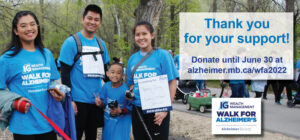In This Issue:
2022 IG Wealth Management Walk for Alzheimer’s: THANK YOU
Let Your Voice be Heard! Participate in Surveys and Focus Groups
Research: Link Between Cataract Removal and Reduced Dementia Risk
Tips on Visiting a Person with Dementia
Join us for the 2022 Dementia Care Professional Development Series
Connecting Through Support Groups
Register for our Summer 2022 Education Session
What’s Behind the Headlines? Don’t Miss Our Upcoming Research Forum!
Keep Checking for Fall Minds in Motion Sessions!
Watch for Community Programs in the Fall!
Research Participants Needed: Live-in Caregivers
Research Participants Needed: Visiting Pods at MB Personal Care Homes
Flaxseed Study Needs Participants
Office Opening Notice
2022 IG Wealth Management Walk for Alzheimer’s: Back Together Again!
There was excitement in the air on Saturday, May 28 at St. Vital Park, and it was for good reason: the Alzheimer Society held it’s first in-person IG Wealth Management Walk for Alzheimer’s since 2019. It was a resounding success! To see families and friends getting together again was a welcome sight. Participants got re-acquainted before and after their walk through the park in their quest to raise money and awareness for the Society. Everyone was smiling!
You can still donate to the Walk until June 30 by visiting alzheimer.mb.ca/wfa2022.
Thank you to all walk participants, donors and volunteers for helping to make the in-person 2022 IG Wealth Management Walk for Alzheimer’s a huge success in support of people living with dementia. Thank you as well to our supporters in communities across the province who got together to run their own events while raising money for the Society.
Let Your Voice be Heard!
Provide your input today for these two new surveys regarding issues affecting seniors in Manitoba!
PROVINCE OF MANITOBA SENIOR’S STRATEGY:
SURVEY AND FOCUS GROUP OPPORTUNITY

Share your perspectives on how the government can support you in your older years. Take the opportunity to identify programs and services you may need to live independently at home and to maintain a vibrant lifestyle.
Start your survey today!
https://engagemb.ca/building-a-plan-for-older-manitobans
*Please note: To engage with this government survey, you will need to create an online profile.
Special Opportunity to Provide Your Input:
The Alzheimer Society is Hosting Focus Groups to Contribute to this Initiative!
The Alzheimer Society of Manitoba invites you to participate in a focus group to provide input that will be shared with the Manitoba government in the development of a plan for older Manitobans.
This plan is expected to provide a framework for supporting older Manitobans to live as independently as they wish in their own homes for as long as it is safe to do so. Input collected as part of this focus group will be shared with the department of Seniors and Long-Term Care and will be an important factor in the development of the plan.
We are looking for older adults living in Manitoba who want to share comments about issues that should be part of an effective plan for older adults.
Where: Robert A. Steen Community Centre (980 Palmerston Avenue, Winnipeg) OR virtual
When: June 21, 10 am to 12 pm (virtual) and June 24 (in-person)
Who: Persons living with dementia and/or primary care partners (spouse/partner or adult child)
As space is limited, please RSVP by June 15 indicating if you will attend and if you prefer to attend the virtual session on June 21 or the in-person session on June 24.
Light refreshments available.
If you would like additional information, please contact Emily with questions or concerns at [email protected], or (204) 943-6622 ext. 219.
WINNIPEG REGIONAL HEALTH AUTHORITY COMMUNITY SURVEY
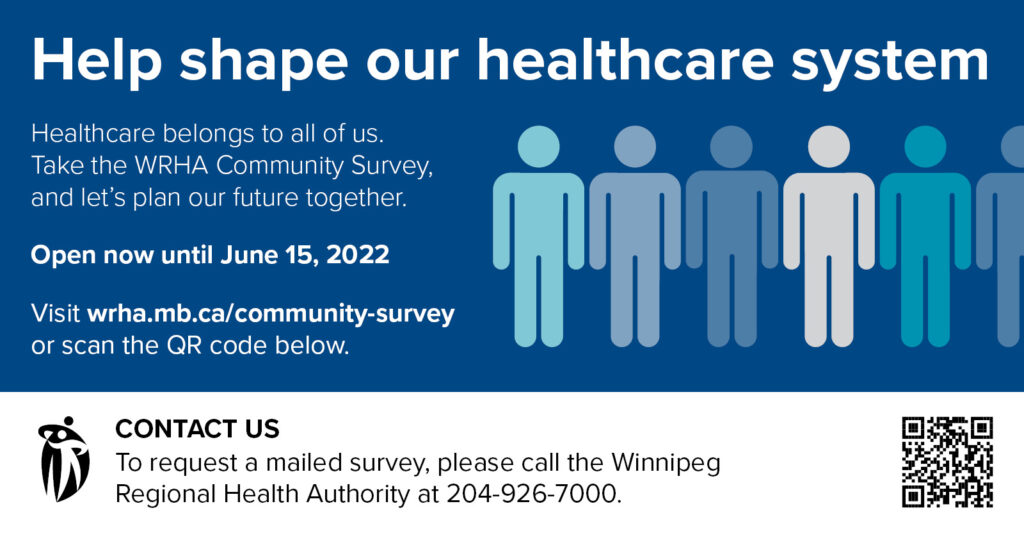
Share your thoughts on the health care system in Winnipeg. This 10-15 minute survey will help the WRHA understand your experiences with home care, senior housing, respite programs, care partner involvement and more!
Start the survey today! It’s open until June 15th, 2022.
https://questionnaire.simplesurvey.com/f/s.aspx?s=D8DCB636-947F-44DF-B9BE-12DD7F3E5AE4&lang=EN
Study Reveals Link between Cataract Removal and Reduced Dementia Risk

Older adults who have cataract surgery may have a lower risk of developing dementia.
That is the finding of an American study published in JAMA Internal Medicine in December 2021 and supported in part by the National Institute on Aging (NIA).
The NIA reported in January 2022 that nearly 50 million people worldwide are affected by dementia. Meanwhile, in the United States, one in three adults over 70 years of age has hearing problems and one in five has issues with their vision.
Because hearing and/or vision problems and dementia are strongly associated with getting older, the NIA says more knowledge about the association between the two may be pertinent information for people as they get older, especially if taking action to improve these senses reduces the risk of developing dementia.
For their study, conducted from 1994 to 2018, researchers worked with 3,038 participants aged 65 and older who were diagnosed with cataracts but were dementia-free when the research began.
Over the 24 years of the study, it was discovered that, compared with participants who did not have cataracts removed, those who did have the surgery had a reduced risk (30%) of developing dementia. This was the case even after other demographic and health risks were accounted for.
The research suggests it is likely that quality of life for the affected individual and family is improved considerably, given the substantial association and its lasting effect beyond 10 years.
It is interesting to note that a reduced risk of dementia did not occur in those who had surgery for glaucoma. This surgery does not restore vision like cataract surgery does.
While it appears that participants who underwent cataract removal surgery had a lower risk of developing dementia compared with participations who did not, the researchers say that more investigation needs to be done to find out how cataract removal and dementia risk are connected.
Tips on Visiting a Person with Dementia
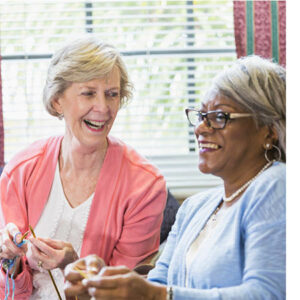
When visiting someone with dementia, changes in the person’s memory may have an impact on conversation and activities. As a visitor you may need to approach your time together a little differently so both you and the person with dementia feel that the visit is successful. Here are some tips:
- Approach your visit in a calm manner, free of expectations about how the person with dementia may respond.
- Establish eye contact and call the person by name.
- If the person thinks you are a stranger, gently remind them of who you are and their relationship with you.
- Ask open ended questions so the person can fill in the narrative. You don’t want them to feel embarrassed if they can’t remember the answer to a specific question.
- Honour the person you are visiting by giving them your undivided attention. If you need to connect with a care provider, find another time to do so.
- When it’s time to leave, redirect the person to another activity, such as mealtime or an activity lead by care providers.
Another idea is to plan your visit around a theme that represents things that the two of you have in common. Be prepared to initiate the activity and to direct the visit, and bring any items you think may help stimulate the memories you share. Some examples of themes include:
Music visits – listen to songs the person enjoys and sing along with them.
Reminiscence visits – bring objects that represent the person’s life experience, such as photo albums or hobby supplies. The materials may stimulate conversation and reminiscence.
Table talk visits – bring a newspaper and a snack and chat about the headlines or family news.
Touch visits – introduce soothing oils or lotions so you can massage the person’s hands and shoulders. Bring items that they can touch, such as a quilt with different materials, furry mitts or a squishy toy.
Active living visits – plan a walk, do some simple gardening or include children in an outdoor playtime visit.
Pet visits – bring your pet or visit with pets that live in the care centre.
Being prepared for a visit in a way that meets the needs of the person with dementia will help you, as the visitor, to feel that the interaction is meaningful for you, too.
One last note: it’s a good idea to inform the care home of your planned activities in case there are any ongoing health protocols in place at the time.
Calling all Community & Healthcare Staff!
Join Us for the New Season of Dementia Care!
Sponsored by All Seniors Care
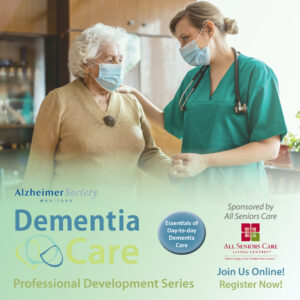
With so much demonstrated interest from attendees, we are continuing to offer Dementia Care 2022 virtually this year. Between April 2022 and March 2023, we’re sharing new topics and building on previous ones with new and returning speakers.
This year’s theme is “Essentials of Day-to-day Dementia Care” to help lay down the foundation for successful and meaningful care that will benefit the person with dementia, their families and the healthcare system as a whole.
Trauma As It Affects the Person with Dementia
Keep Thursday, June 9 from 2 to 3:30 pm open to learn more about this important topic from two qualified presenters. You will be provided with tools and strategies to give you insight on how to help people with dementia who have been affected by trauma.
To Respond or Not to Respond? A Systematic Approach to Understanding Responsive Behaviours
Join us on Thursday, September 15 from 2 to 3:30 pm for interactive discussions and case examples exploring a wide range of responsive behaviours associated with dementia, including expressions of intimacy.
And there’s more…!
Learn more about this year’s sessions and speakers on our website and register now!
Connecting Through Support Groups

The Alzheimer Society is offering virtual and *limited* in-person support groups to help support those in their dementia journey.
For Care Partners: A variety of days and times are available for those interested in joining a virtual or in-person support group for care partners. These groups help connect people with others living in a similar situation during these uncertain times. Click here to register for a date and time that suits your schedule or contact your local Society office for more information.
Ambiguous Loss Support Group for Care Partners: Ambiguous loss is a type of loss felt when a person with dementia is still physically here, but may not be mentally or emotionally present in the same way as before. This specialized support group is an eight-week program to help care partners navigate this type of loss.
Please contact your local office to see if this group is right for you and for more information about upcoming offerings.
For People with Dementia: These groups help to ensure continued access to support and information for those living with dementia. Groups are facilitated as weekly meetings, over an eight week block, and provide participants an opportunity to:
- Learn about living with dementia and its progression.
- Share feelings and common experiences.
- Exchange practical coping strategies.
- Participate in discussions.
For more information about in-person and virtual support groups for persons with dementia, please contact:
Sarah Dueck
Client Support Coordinator
204-943-6622 ext. 213
[email protected]
Register for our Summer 2022 Education Session
Come join us for our summer education session, sponsored by Edison Properties. This session will be available both in-person and virtually over Zoom, where it will be streamed live.
 Medical Assistance in Dying (MAiD)
Medical Assistance in Dying (MAiD)
Sponored by Edison Properties
Wednesday, August 3, 2022
2 to 3 pm
Winakwa Community Centre, 980 Winakwa Rd., Winnipeg
Speaker: Dr. Kim Wiebe, Medical Director, Medical Assistance in Dying, Shared Health Services (Manitoba)
This session will focus on the what, when, where, why and how pertaining to Medical Assistance in Dying (MAiD) in Manitoba. MAiD is a service provided to eligible patients who wish to voluntarily end their life due to serious and incurable medical or health reasons. MAiD can only be provided to patients who can give consent. Learn more at this informative session.
To register, call or email Emily Kinnaird at 204-943-6622 or [email protected]. You can also keep an eye on our website for registration to open. Past participants will receive a directed eblast on June 15 for upcoming sessions.
Alzheimer Society of Manitoba Research Forum
Sponsored by Brightwater Senior Living
MARK YOUR CALENDARS!
Tuesday, September 21 at 6:30 pm
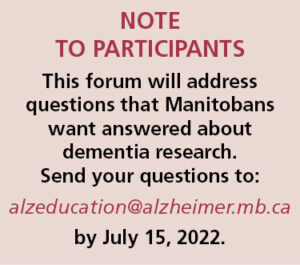 After a successful and engaging presentation last year, Dr. Donald Weaver of the Krembil Research Institute will be back for the Annual Research Forum!
After a successful and engaging presentation last year, Dr. Donald Weaver of the Krembil Research Institute will be back for the Annual Research Forum!
Join us for this public forum where Dr. Weaver will once again shine a light on current and emerging dementia research. In this dynamic conversation, Dr. Weaver will discuss new diagnostic techniques, ongoing clinical trials for treatment, primary prevention strategies and MORE!
A s well as being a practicing neurologist, Dr. Weaver is an internationally recognized research leader in university-based drug design and discovery for neurological disorders. He has designed and co-developed two drugs that have reached phase III human trials and has four others in preclinical development. He has been the Director of the Krembil Research Institute, University Health Network, since 2013.
s well as being a practicing neurologist, Dr. Weaver is an internationally recognized research leader in university-based drug design and discovery for neurological disorders. He has designed and co-developed two drugs that have reached phase III human trials and has four others in preclinical development. He has been the Director of the Krembil Research Institute, University Health Network, since 2013.
Don’t miss out on this engaging forum. Watch for registration information – it’s coming soon!
Thank You for Participating in Minds in Motion®!
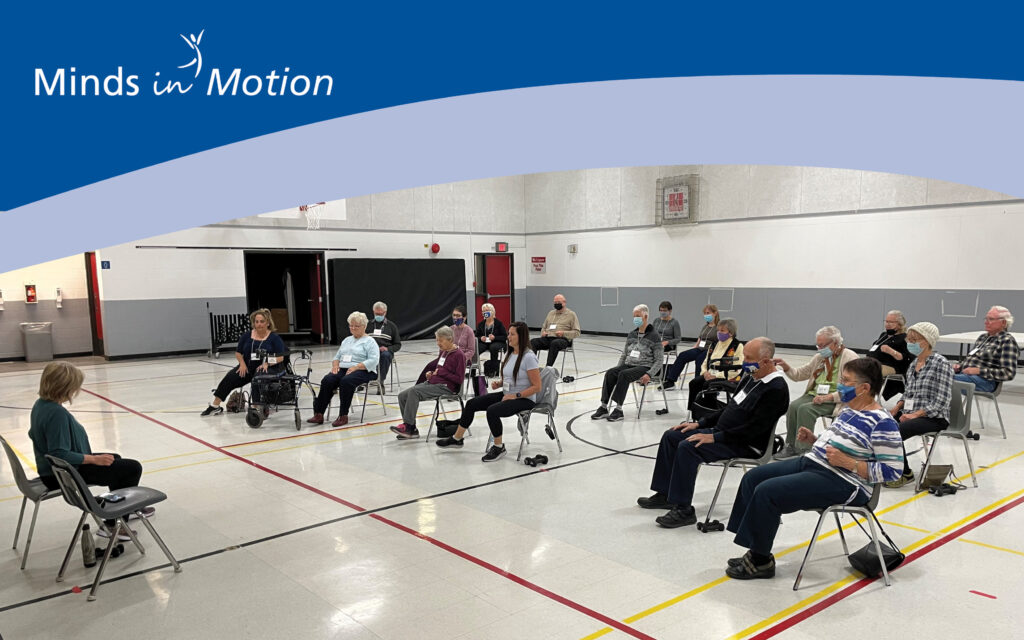
We had a successful spring session of Minds in Motion programming – our staff and volunteers were happy to see faces in person again at many of our partnering organizations!
Stay tuned for information about fall 2022 sessions on our Minds in Motion website! Location, dates and times will be available by September 1.
See you in the fall!
Stay fit, stay connected, stay engaged!
Discover. Explore. Get Involved.
Watch for our Community Programs this Fall!
The Society partners with community organizations to offer dementia-friendly programs that encourage continued participation in community activities after a dementia diagnosis. They are fun, engaging and educational!
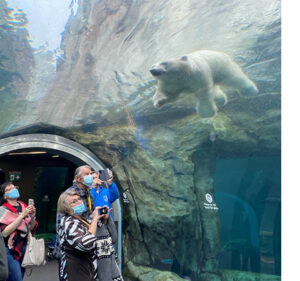 Organizations the Society works with include:
Organizations the Society works with include:
- Winnipeg Art Gallery for the program, Art to Inspire
- Assiniboine Park Zoo for the program, Journey’s Through the Zoo
- FortWhyte Alive for the program, Tales Along the Trail
- Manitoba Museum for the program, Then and Now: A Journey in Time
For more information on these programs and for fall 2022 dates and times, check out our website here.
In the meantime, we encourage you to stay engaged in your community by visiting our community partners over the summer.
Perspectives of Live-in Caregivers on Home Care Services
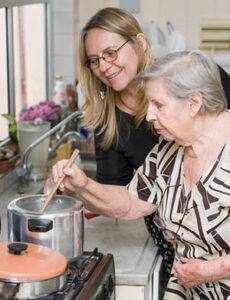 Are you a live-in caregiver for a family member or friend who receives services from Home Care? Would you like to share your experiences?
Are you a live-in caregiver for a family member or friend who receives services from Home Care? Would you like to share your experiences?
A researcher from the University of Manitoba is recruiting participants for a study that will investigate the unique perspectives of live-in caregivers regarding how home care services may affect their lives and the home in which they live. The information gained may inform policy work that benefits caregivers in Manitoba, and thus may help other families in the future.
Participation in this research is fully confidential and involves individual interviews and a brief tour of the person’s home.
Those interested in participating are encouraged to contact the lead investigator:
Kaitlyn Kuryk
Department of Sociology and Criminology
University of Manitoba
Phone: 204-250-3706
[email protected]
Click here for details about this research, including a sample of the consent form. Please contact the researcher for information on how to get involved.
Exploratory Study of Visitation Shelter/Pods at Manitoba Personal Care Homes
If you have used a visitation shelter/pod at a personal care home (PCH), you could be part of a study to assess your experiences.
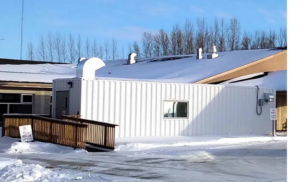 To participate in this survey, you must be 18 years or older and:
To participate in this survey, you must be 18 years or older and:
- have visited a PCH resident in a visitation shelter/pod
- reside in a PCH and used the visitation shelter/pod
- be a PCH staff/volunteer who has been assigned to assist with the facilitation of visits.
The Centre on Aging is conducting this research project. Participants will complete a survey that will take about 10 to 20 minutes to complete.
To participate, use this link to complete the survey: https://www.surveymonkey.com/r/3PFRP7K
If you would like more information, please contact Nicole Dunn at [email protected]
Click here to see the poster describing this study.
Can Dietary Flaxseed Improve Memory?
You Could Help Researchers Find the Answer

Researchers at the St. Boniface Hospital Research Centre are calling for participants for an intriguing study: they want to find out if consumption of a flaxseed beverage will improve memory function in people with dementia.
The team of three investigators is headed by Dr. Benedict C. Albensi, a leading researcher working in the area of chronic brain disorders, including Alzheimer’s disease.
If you want to learn more, call 204-235-3941 or email [email protected]
Click here for a poster with detailed participant information about this study.
Office Opening Notice
The Alzheimer Society office in Winnipeg re-opened its doors to the public as of Monday, April 4th. We will continue our virtual support and adhere to COVID-19 protocols as needed. We require guests to wear masks throughout the office. If you do not have a mask available, we will provide one for you.
Once seated, guests have the option to remove the mask if they can social distance from others.
For more information, please contact us at 204-943-6622.
Remember: You are not Alone.
We are here to help you and your family through these difficult times. You can reach a comforting ear by phone or get a quick response by email. Call us at 204-942-6622 (Winnipeg), 1-800-378-6699 (toll free in Manitoba) or email [email protected]

